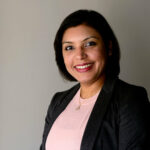In conversation with Shilpa Wagh on Career Changers, WFAN.
Shilpa has been in the workforce for the last 30 years, she has been in the financial services industry for the last 10 years. We are talking to Shilpa about her journey in the last 30 years and about the switch she made from the corporate career to one which gave her both flexibility and financial independence.
Q. Shilpa you started working in 1993, which is very encouraging. But you were in a completely different field and switched to financial services about 10 years ago, talk to us about what made you make this transition.
A. When I finished my masters in computer applications in 1993, I started working as a software professional and worked with companies like L&T and Siemens. In 2001 I decided it was time for me to start out on my own because as a software professional I had certain time pressures, but I wanted to give some time to my family, my daughter. I started as a consultant in IT itself as it was what I knew and where I was comfortable. That continued till 2008, at that point there was an economic slowdown and IT companies started moving out of Mumbai to save cost. Along with that, in times of a slowdown, what gets hit first is IT and corporate training. There were many challenges then to get jobs because I was a freelancer, and even if jobs were there I would have to travel. I was not sure whether everything at home could be managed if I stayed away for say 15 days. It wasn’t that I didn’t have support, rather it was about my personal wants and values.
Then I decided to find work which had local appeal and at the same time would not become a hurdle in managing my time at home. I identified one of my strengths as having the knowledge of numbers, having studied statistics. Coming from IT I also had good analytical skills and grasping power. That’s when I thought about venturing into finance, plus my husband being a chartered accountant was an added advantage. I had to move slow as I knew nothing about this line of work. I started at the beginning by trying to understand what exactly mutual funds are and what this term NAV means!
While the trend is changing now, most women are ready to earn money and are not ready to manage money. I was the same, I was happy in IT and my husband was the one managing mutual funds and insurance. I had to start from scratch, being someone who understands knowledge. I wanted to do something which helped me gain this knowledge. I started meeting people who had shifted from non-financial jobs to financial services.
In 2012 I got certified as a financial planner. At the time financial planning was not popular and charging a fee for it was unheard of. It was tough but slowly as I continued to maintain my stance, things got better and I kept the focus on financial planning.
Q. It must have been very difficult to stay with a fee-only practice and not be lured by a quick sale of a financial product.
A. Fortunately, in 2013, SEBI came out with the Registered Investment Advisor guidelines. It’s a license which you need to apply to. I jumped at this opportunity and got registered as a SEBI recognised RIA. This regulation clearly states that as an advisor I can earn fees from my client but no other income in other forms. This matched my values and ethics and I felt this was made for me.
Q. You moved from the comfort of your IT job, what were your initial struggles like? At the same time, you had the comfort of moving to a work-life balance that you were consciously seeking, how did you manage this change?
A. It was tough to adjust. For the first few months, not earning anything makes you very uncomfortable. Before shifting from IT to personal finance I was a consultant. For this shift, I was moving to a different industry and way of working and it’s not certain whether the inflow will come and whether it will be enough. At times I had to wait for a month or two without seeing any clients. For me, at a personal level, it was a change and the industry was different. The first one year was very difficult.
After 2013 and the new RIA guidelines, it became better. There were a lot of discussions about fee only advisors.
Q. What is it that you don’t miss about your corporate days?
A. I do miss the fun which you have when you are in a group of people. From a work perspective, I am happy, but it is a lonely job. There is satisfaction in helping people out with their finances.
There are moments when fees get upgraded or at the time of renewal when clients show their appreciation which feels great. It is not about the fees then but about the emotions with which they express appreciation which gives me a lot of satisfaction. It means I am making a difference to someone’s life. This is a profession which will not happen overnight. With money, people are very careful as they have to disclose every financial aspect, right from income to fixed deposits and share. It’s like looking at the financial kundli and happens only with trust.
It is now at a point where I have to tell new clients to defer their joining to the next month as my plate is too full.
Q. There are many women who chose to quit their careers and take care of their home or not even start their careers, do you think that it makes sense for them to try and venture out to careers or is it too late?
A, It is never too late. However, the longer they are at home the harder it is. Firstly, there is a lot of inertia which makes them believe that no one will accept them outside. Secondly, the family is also used to seeing them around and suddenly if you declare you will go out and work, you do need their support. The family should appreciate that this person has given her best years to the family and they should help her, because it is difficult for her as a homemaker to move out. She has been cut off from the outside world in many ways and now wants to venture to the corporate world or start her own venture, there are many phases she has to cross. There is going to be introspection and coping with the changing corporate culture; every ten years a new generation comes into the workforce and she may find she has to work with someone her child’s age. There are so many dynamics involved. The lady herself also has to make the beginning and take the first step.
Coming from my experience and seeing other women, I have started an e-portal called CapellaZen for women. Here we have identified four aspects, personal finance, career management, legal rights and fourth is overall well-being. I would like women to work on these four aspects. Women often put their family first and forget about taking care of themselves. With this e-portal, I hope to help other women in different aspects of their lives.







0 Comments